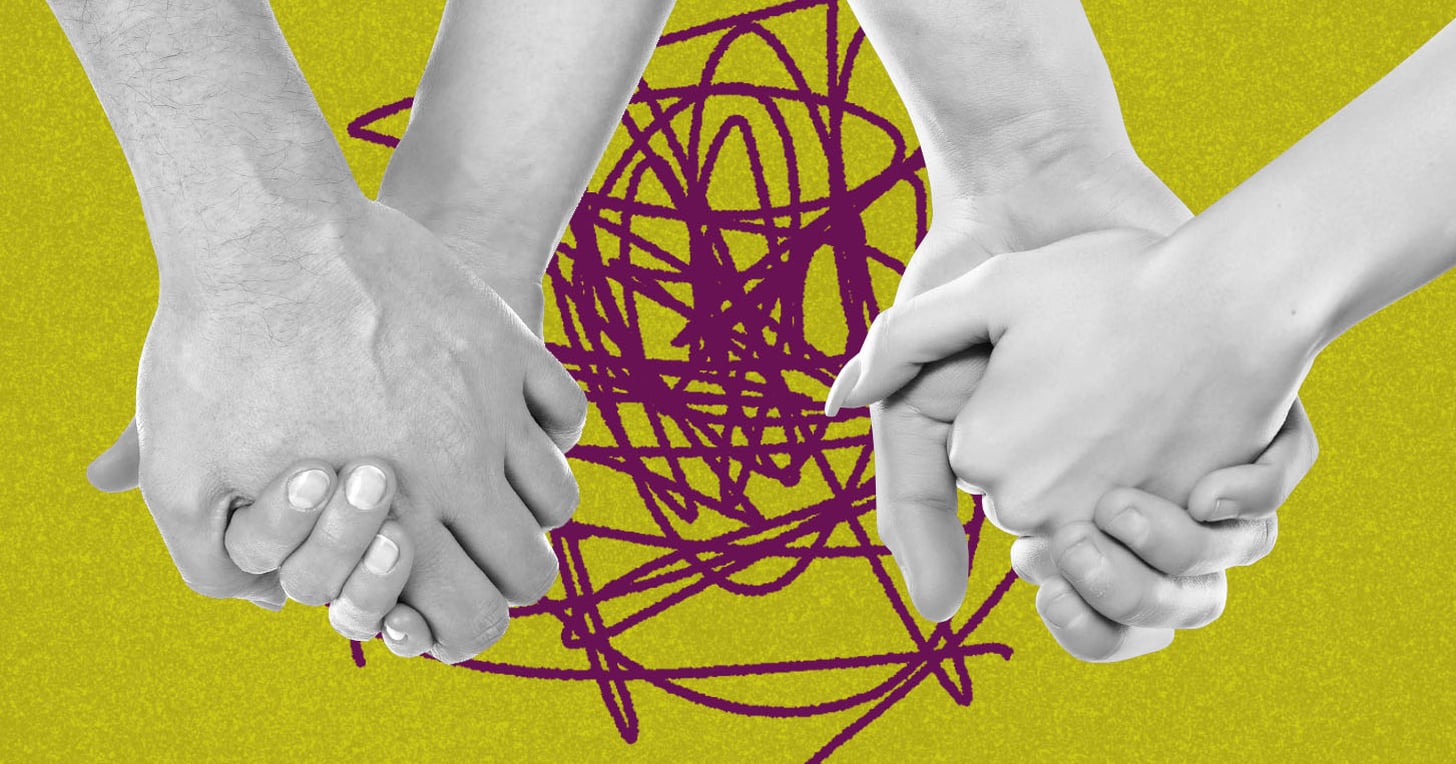You might have heard the term “relationship escalator” before – often used to describe the traditional progression of a romance from first date to monogamous relationship to moving in together to marriage to parenthood. But some people choose to never get on that relationship escalator. Instead, they may take the stairs, stay on one floor, hit the emergency “stop” button and jump off, or go down the escalator completely. This philosophy is what people refer to as “relationship anarchy.”
Like the “living apart together” movement, relationship anarchy (sometimes called “RA”) is a way of approaching connection outside of the typical societal scripts. The only rule is that there are no rules. “The key concept is that no relationship should be bound by any rules not entirely agreed upon by the involved parties,” Feeld’s State of Dating report states.
In the report published in June, Feeld found that although the term “relationship anarchy” is still new, awareness of the approach itself is growing, particularly among Gen Z and younger millennials, the LGBTQ+ community, and those practicing ethical non-monogamy. After being given the definition of relationship anarchy, 20 percent of non-Feeld members and 50 percent of Feeld members said they are currently or had previously practiced it themselves.
Clearly, more and more people are starting to rethink what relationships can look like. But what does relationship anarchy really mean? And what are some of the benefits? Below, we spoke with actual relationship anarchists on the lifestyle.
What Is Relationship Anarchy?
The term relationship anarchy was popularized by self-described “genderqueer relationship hacker” Andie Nordgren in 2006. In Nordgren’s description, relationship anarchy “questions the idea that love is a limited resource that can only be real if restricted to a couple.” In this type of dynamic, people and relationships aren’t ranked or compared, and “each relationship is independent.”
In practice, the definition varies from person to person. For some, relationship anarchy means they treat non-romantic relationships – specifically close friendships and familial relationships – with as much care as romantic relationships. “I never thought that romantic relationships were inherently more important or should be focused on more than any other kind of relationship,” relationship anarchist Christine Marie, 46, says. “I don’t buy into traditional hierarchies. I value my friends as much, if not more than, my romantic relationships. To me, relationship anarchy is really about consciously creating relationships.”
“I never thought that romantic relationships were inherently more important or should be focused on more than any other kind of relationship”
Many relationship anarchists are also polyamorous, but these are two overlapping circles – not synonyms. “Relationship anarchy is more about challenging conventional norms and hierarchy than it is about non-monogamy or monogamy,” Marie says.
Ashley Wang, 27, a sexual health educator and pleasure activist, was introduced to the concept of relationship anarchy by a polyamorous partner. For her, relationship anarchy means centering personal freedom and treating all relationships with care and consideration. “I see polyamory and relationship anarchy as two sides of the same coin,” she says. “I’m very happy identifying as solo poly, but that doesn’t mean it’s mutually exclusive with feelings, care, respect, or even love.”
On the other hand, Maya, 26, who asked that we only only use her first name, is monogamous and also identifies as a relationship anarchist. She discovered the term in lesbian spaces online and resonated with the politics. “We live in a heteropatriarchal society that puts so much emphasis on romantic relationships, particularly heterosexual relationships,” she says. “For me, my relationship anarchy praxis and my feminist praxis are very connected. I don’t have to conform to these ideas that our society has about what relationships are supposed to look like, especially as a woman and as a woman who dates men.”
What Are the Benefits of Relationship Anarchy?
One of the main benefits of relationship anarchy is the ability to define exactly what you want in a relationship, rather than following the traditional “relationship escalator.” Rosael Torres-Davis, 38, discovered relationship anarchy after a breakup while getting involved in her local polyamorous community in Philadelphia. She chronicles her journey on her Substack, “Love and Sex in Gritty City.”
“I started asking myself, what do I really want in my relationships? What are my goals in life?” she tells Popsugar. “I realized I don’t want to bring anybody to live with me, at least for the foreseeable future; it can change.” She also likes the way relationship anarchy allows for changing needs and goals. “One thing about relationship anarchy is it’s always flexible; it’s always changing and evolving. I think that’s the center of it.”
For Maya, one benefit of relationship anarchy is the way it allows people to define their self-worth without regard to their relationship status. “I’ve separated myself from the idea that I need romantic partnership in order to feel fulfilled,” she says. “Would it be nice to have one day? Yes. But ultimately, it’s about unlearning the idea that a relationship is a prize.”
Wang also adds that relationship anarchy affirms her queerness. “It’s so intertwined with my queer identity,” she says. “I’m at a point in my sexuality where fine is fine. If there’s attraction or there’s vibes, I’m here for it, same with my gender.” Another bonus? There’s no set timeline for relationship milestones. “I love that I get to be free and define [my relationships] on my own terms,” Wang says.
What Are Some Things People Have to Consider as Relationship Anarchists?
One challenge of relationship anarchy is the fact that the term and the concept aren’t yet mainstream, which means that relationship anarchists generally have to do a lot of explaining. “No one knows what you’re talking about when you say it,” Marie says. And once she’s explained the idea, not everyone is on board. “There are some people who are very rigid about how they want their relationship to go, and they aren’t willing to have constructive conversations about what works and what doesn’t.”
Maya points out that practicing relationship anarchy sometimes leads to distance from loved ones who have more traditional ideas about relationships. “I do sometimes feel disconnected from my friends who aren’t aligned with that mindset,” she says. “I also sometimes wonder what it’s going to be like as my friends and I continue to get older and people pair off and get married and have kids and stuff. But, ultimately, I know that my journey is my journey, and just because it looks different from other people’s doesn’t mean it’s wrong, or that theirs is wrong.”
“I know that my journey is my journey, and just because it looks different from other people’s doesn’t mean it’s wrong”
Balancing the time and emotional energy needed to nurture multiple relationships can also be a challenge. “You really have to like scheduling,” Torres-Davis says. “But I like how it forces you to be very present because you’re very intentional about how you want to spend time together.” Challenges also come up with long-term planning: “For example, let’s say we have a goal of buying a vacation home. If I’m not married to you, what does that financial planning look like? How do we make it fair?”
Is Relationship Anarchy Right For You?
Some people find that moving toward the traditional relationship escalator is what they want. But everyone can benefit from reflecting on why they want what they want. “Look inward and really evaluate what you want and how you feel versus what society at large is telling you to want and how you should feel,” Maya says.
If relationship anarchy sounds appealing, trying it out doesn’t mean you’re locked in for life. “When it comes to dating, I say just try it,” Torres-Davis says. “Give yourself time before putting any labels on it. And if you want to change your mind later on, you can.”
Many people who prefer traditional relationships may find some of the ideas and values of relationship anarchy helpful. “Even if you are in a committed long-term relationship with just one person and you’re happy and satisfied with it – which if you like it, I love it – you can still benefit from accepting that one single person cannot fulfill every single aspect of your life,” Wang says. “Prioritizing your friends is like one of the biggest things that I always advocate for, as well as spending time with your family and spending time by yourself.”
Erika W. Smith (she/her) is a freelance writer and editor who covers astrology, sex, relationships, lifestyle, and more. Her book series Astrosex was published in 2021.



